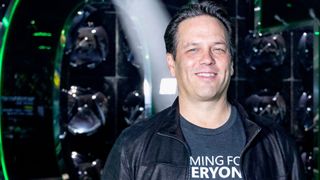Phil Spencer says studio acquisitions are good for the videogame industry
Entrepreneurs who take the risk of launching a studio should be able to reap the rewards of their efforts if it's successful.

Microsoft has been on a real acquisition tear over the past few years. Bethesda Softworks is the obvious crown jewel, but in recent years it's also nabbed developers including Mojang, Double Fine, Ninja Theory, Compulsion, inXile, and Obsidian. The Microsoft Store is still a mess (although it's possible Windows 11 may finally bring about some improvements on that front) but Microsoft itself has grown in leaps and bounds as a first-party publisher.
PlayStation Studios chief Hermen Hulst recently threw a bit of shade at Microsoft over its free-spending ways, telling GQ that Sony isn't engaging in an acquisition "arms race" because "we're very selective about the developers that we bring in."
"It's not like we're going around and just making random acquisitions," Hulst said. "They’re very, very targeted acquisitions of teams that we know well."
Unsurprisingly, Microsoft's Xbox boss Phil Spencer sees the situation very differently. In a recent interview with IGN, Spencer acknowledged that some people might question whether acquisitions are good for the industry, but explained why he believes they are.
"Starting a new studio—starting any small business, frankly—is a very risky proposition. Starting a videogame studio is even more so," Spencer said. "And if a team actually takes the risk of starting a new company, starting a studio, building that over years, building value in that, to say that they shouldn't sell, I think is just short-sighted."
Spencer said the opportunity to "realize the value of what they created" through a buyout is one of the reasons that some people take the risk of launching new studios, the implication being that the absence of that opportunity could mean that some studios simply wouldn't be founded—and by extension, that some games wouldn't get made.
"It doesn't mean every team has to end up selling their studio, but I think it is a natural and healthy part of our industry that certain teams will start a studio—many of them will fail, we know most small business will fail, whether it's videogames or anything else," he continued. "But those that make it through—and it's such a kind of risk-filled journey for them—to get to the point to create real value, I'm always going to congratulate [them] when teams get to where they realize that value through acquisition, or just massive independent success if that's the path they also start to go on."
The biggest gaming news, reviews and hardware deals
Keep up to date with the most important stories and the best deals, as picked by the PC Gamer team.
Interestingly, while Spencer said that Microsoft is "always out there looking at where we could continue to build our first party capability," he also suggested that it might not be focused on mainstream games going forward.
"When I look at the portfolio, I still think there's an opportunity for us with more family-friendly content," he said, "When I think about the geographic diversity of our first-party studios, I think there's still work for us to do there."
Microsoft CEO Satya Nadella said in September 2020 that the company isn't finished buying game studios, and Bloomberg actually reported in November 2020 that Microsoft was looking for a Japanese studio to add to its stable. Spencer denied that claim a few days later, however, saying that while he has an "affinity for Japanese studios," as far as he's aware Microsoft isn't actively shopping for one.
Thanks, VGC.
Andy has been gaming on PCs from the very beginning, starting as a youngster with text adventures and primitive action games on a cassette-based TRS80. From there he graduated to the glory days of Sierra Online adventures and Microprose sims, ran a local BBS, learned how to build PCs, and developed a longstanding love of RPGs, immersive sims, and shooters. He began writing videogame news in 2007 for The Escapist and somehow managed to avoid getting fired until 2014, when he joined the storied ranks of PC Gamer. He covers all aspects of the industry, from new game announcements and patch notes to legal disputes, Twitch beefs, esports, and Henry Cavill. Lots of Henry Cavill.
Most Popular






